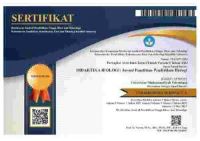- Focus and Scope
- Section Policies
- Peer Review Process
- Publication Frequency
- Open Access Policy
- Archiving
- Screening for Plagiarism
- Publication Ethics
Focus and Scope
The focus of Didaktika Biologi is research result in the field of biological education and The scopes of Didaktika Biologi are as follows.
- Motivation, perception and profiles of educators and learners in learning process and biological learning
- Development and application of learning sources and media
- Design of biological learning
- Application of biological learning in schools (classroom action research and quasi experimental research)
- Evaluation of biology education
- Lesson study
Section Policies
Artikel (Articles)
Peer Review Process
The policies that applied in manuscipt assessment that will be published in Didaktika Biologi are as follows.
- The manuscipt submitted to the editorial will be reviewed by Reviewer Team of Didaktika Biologi in blind peer-review for the feasibility assessment of article publication.
- The Reviewer Team of Didaktika Biologi comes from various institutions that have expertise in various fields, namely education, biology education and biology.
- The matters related to the manuscript assessment by reviewers are article title, abstract, introduction, research method, result and discussion, conclusion, bibliography, authenticity, novelty, presentation clarity, and contribution to biology education.
- The reviewers give the recommendation for either acceptance or rejection of a manuscipt after the review process.
- The editors make the decision for either acceptance or rejection of a manuscipt.
Publication Frequency
Didaktika Biologi is published twice in a year; on March and September with seven articles for each edition. It is also published in two versions; print out and electronic.
Open Access Policy
Didaktika Biologi provides immediate open access to its content on the principle that making research freely available to the public to supports a greater global exchange of knowledge.
Archiving
This journal utilizes the LOCKSS system to create a distributed archiving system among participating libraries and permits those libraries to create permanent archives of the journal for purposes of preservation and restoration. More...
Screening for Plagiarism
Screening for manuscript's plagiarism is still done by reviewers using the application they have. If the reviewers' review shows plagiarism above 25 %, the editor will reject the manuscript.
Publication Ethics
Didaktika Biologi adheres completely to the publication ethics in article publication.
1. Publication and Authorship- The manuscipt submitted to the editorial will be reviewed by Reviewer Team of Didaktika Biologi in blind peer-review for the feasibility assessment of article publication.
- Authorship credit should be based on 1) contribution to biology education; 2) drafting the article or revising it critically; 3) final approval of the version to be published; and 4) agreement to be accountable for all aspects of the work in ensuring that questions related to the accuracy or integrity of any part of the work are appropriately investigated and resolved. Every author should meet all of these four conditions. After the submission of a manuscript, any changes whatsoever in authorship (adding author(s), deleting author(s), or re-arranging the order of authors) must be explained by a letter to the editor from the authors concerned. This letter must be signed by all authors of the article.
- Correction of authorship after publication: Didaktika Biologi does not correct authorship after publication unless a mistake has been made by the editorial staff. Authorship may be changed before publication but after submission when an authorship correction is requested by all of the authors involved with the manuscript.
2. Originality, Plagiarism, and Duplicate Publication
Submitted manuscript must not have been previously published or be under consideration for publication elsewhere. Submitted manuscript is screened for possible plagiarism or duplicate publication. If plagiarism or duplicate publication related to the article of this journal is detected, the manuscript may be rejected, the author(s) will be announced in the journal. There will also be penalties for the author(s).
3. Conflict of Interest Statement
Manuscipt submitted to the editorial must have no conflicts of interest resulting from competitive, collaborative, or other relationships or connections with any of the authors, companies, or institutions connected to the article or academically related issues. Manuscript with conflicts of interest will not be reviewed. Therefore, the author must inform the editor of any potential conflicts of interest that could influence the authors’ interpretation of the data. In particular, all sources of funding applicable to the research from companies or institutions should be explicitly stated to avoid the conflicts of interest.
4. Reviewer by Partnership
The Reviewer Team of Didaktika Biologi comes from various institutions that have expertise in various fields, namely education, biology education and biology. Reviewers help editor in making decisions on the received manuscript. Reviewers give the recommendation for either acceptance or rejection of a manuscipt after review process. It should be conducted objectively, with no personal criticism of the author. Reviewers should express their views clearly with supporting arguments.
5. Editorial Responsibilities
The Editorial Board will continuously work to monitor and safeguard publication ethics: guidelines for retracting articles; maintenance of the integrity of the academic record; preclusion of business needs from compromising intellectual and ethical standards; publishing corrections, clarifications, retractions, and apologies when needed; and excluding plagiarism and fraudulent data. The editors maintain the following responsibilities: responsibility and authority to reject and accept manuscripts; avoiding any conflict of interest with respect to manuscripts they reject or accept; promoting publication of corrections or retractions when errors are found; and preservation of the anonymity of reviewers.








